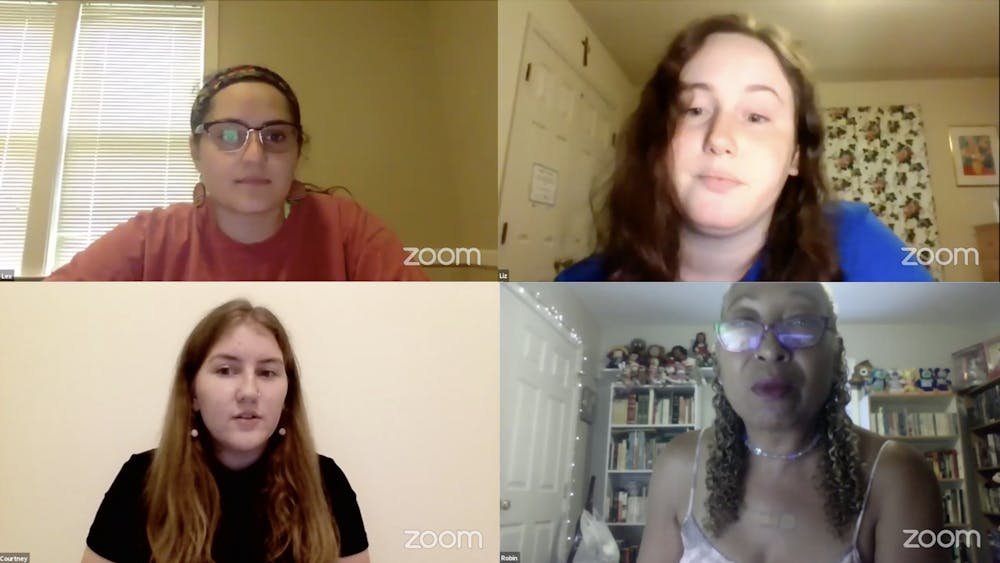Elon University students, faculty, staff and community members spoke tonight during a virtual town hall organized by the Boldly Elon Solidarity Collective, titled “We Won’t Die for Elon,” to protest the university’s decision to bring students back to in-person classes this fall.
Moderated by Elon senior Alexis Malaguti and Elon junior Liz Clark, speakers from Elon University and the surrounding Alamance County community spoke on a variety of topics centered around policies on returning to classes amidst a pandemic, as well as issues facing adjunct faculty members, the surrounding Elon area, and racial injustice.
“It’s clear it’s not safe for in-person classes to resume this fall,” Clark said. “It’s clear that Elon has no genuine infrastructure of protections for faculty, staff, students, and campus workers.”
Malaguti and Clark condemned the university’s current remote teaching and learning accommodations process. Faculty are required to go through a seven-step application and approval process. Students can request remote learning based on disabilities or “unique circumstances” that aren’t related to a personal health issue or disability to be reviewed on an individual basis. Housing would not be included in the options for students.
“Elon administrators have made accommodations available to students who wish to do online learning after a good deal of pushback, but these are accommodations only in theory,” Malaguti said. “They are available only if students apply through disability resources, fill out a confused web of documentation and provide evidence that they have a preexisting medical condition rather than a healthy fear for their lives.”
Offering online classes while allowing students to stay on campus is “the moral choice” for Elon to make, Clark said. Housing and food services provide a resource for students who are food insecure or do not have safe home lives, according to Clark.
“Elon’s worrying over its revenue stream when students are literally willing to pay to stay on campus and learn safely,” Clark said. “It’s a privilege not to consider these risks that many students live with.”
The university budget committee approved a 5% budget cut for the next two academic years due to the financial impacts of the coronavirus. Tuition and fees have also been set for this fall; according to a disclosure statement on the Ready & Resilient webpage, tuition money goes towards learning, academic and non-academic services provided by the university.
Sophomore Alyssa Meritt, a public health student at Elon, said that returning to school when pandemic conditions have become worse than when Elon stopped in-person classes in the spring is “ridiculous.”
According to the North Carolina Department of Health and Human Services, North Carolina has reported over 126,000 cases of COVID-19, as well as over 1,900 deaths.
Meritt said despite this, the university is trying to ensure student safety, but that does not account for student actions.
“I feel that they have made appropriate accommodations to ensure that we will be safe, but that is not accounting for student stupidity,” Meritt said. “Most people are not wearing their masks and going out and still partying and still acting as if this never happened.”
Senior Courtney Guthrie is a resident of Burlington in Alamance County and is concerned about how students coming back to Elon will affect her community.
“It would be an understatement to say that other community members and I have been treated like an afterthought in the development of Elon University’s reopening plans for fall 2020,” Guthrie said. “This is not easy for anyone, but much less for the people who have no say in the decisions that will severely impact their personal, professional and academic lives.”
Guthrie said she is facing the reopening of Elon twofold, both as a student and a resident of the area.
“I live here, my family lives here,” Guthrie said. “When there is an outbreak, I won’t have a flight home to catch through RDU. I can’t pack up my car and drive away from this problem.”

One of several things Junior Trinity Dixon spoke out against was the lack of protections for students, faculty and staff, like the layoff of former adjunct professor of sociology Robin Gary.
“In this series of untransparent and noncomphreneisve policies, Elon has still decided to reopen with little to no guarantees or protections for students, staff or campus workers,” Dixon said. “The irrefutable root of these problems, and many problems at Elon, are these policies are made by the least vulnerable members of society.”
Gary also spoke during the town hall about being laid off from the university, which she said left her without health insurance in the middle of the pandemic. She said that she has no recourse to fight the loss of her job “except to sue Elon.”
Gary also joined in speaking out against the university’s plan to reopen campus and said that there is no reason for Elon to not shift to online classes.
“There is absolutely no reason why they shouldn’t shift to online classes,” Gary said. “They’re more worried about getting that room and board money and that tuition money than they are about the safety and wellbeing of the rest of us.”
The town hall was livestreamed on Facebook and currently has over 1,300 views. According to Malaguti, she is proud of everyone who spoke and saw her concerns validated during the event.
“My concerns and the concerns of those I share a community with felt realized on a much larger scale,” Malaguti wrote to Elon News Network when asked about the town hall. “While I understand that not everyone who attended is likely to agree with everything that was said, they deemed our town hall and the words of those who spoke important enough to listen to and that’s not nothing!”


